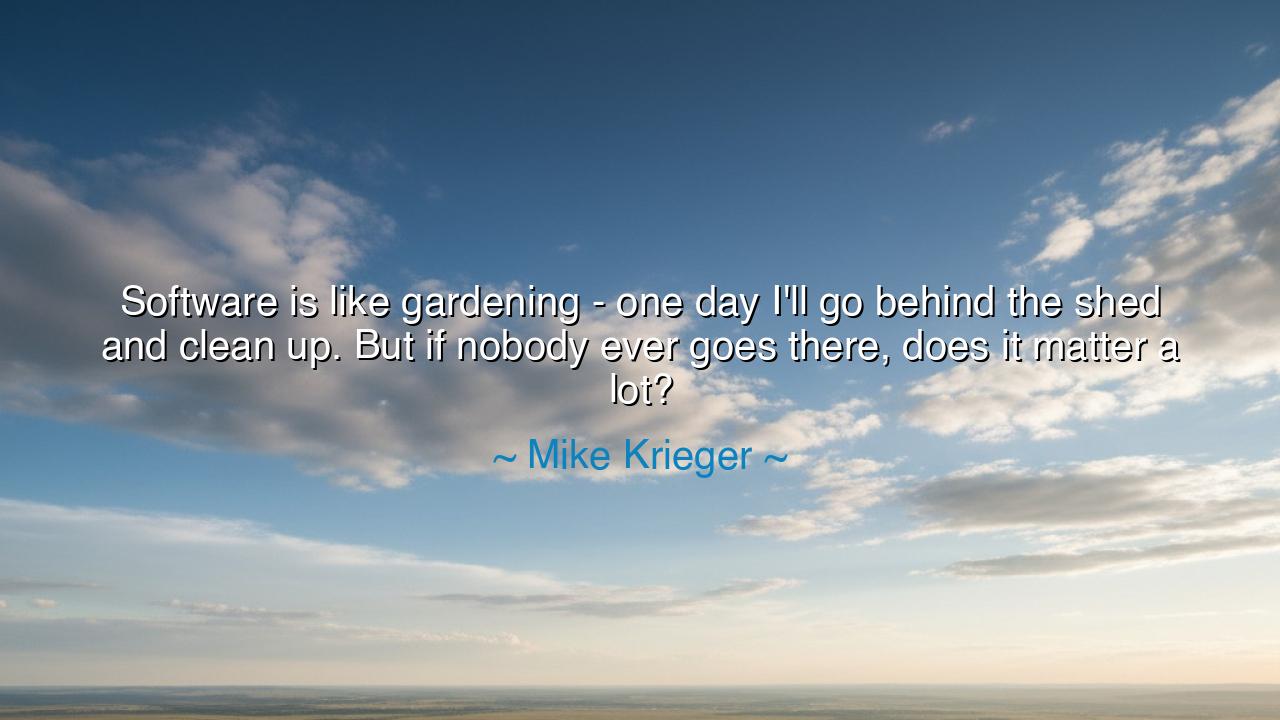
Software is like gardening - one day I'll go behind the shed and
Software is like gardening - one day I'll go behind the shed and clean up. But if nobody ever goes there, does it matter a lot?






“Software is like gardening—one day I’ll go behind the shed and clean up. But if nobody ever goes there, does it matter a lot?” Thus spoke Mike Krieger, co-founder of Instagram, a craftsman not of stone or steel but of code—one who shaped the digital gardens of modern life. In this statement, half in jest yet rich in wisdom, he compares the invisible architecture of technology to the tender and ceaseless labor of the gardener. It is a reflection not only on software, but on the art of creation itself, and the eternal tension between perfection and purpose. For in these words lies a truth known to all builders: that what we create is never finished, yet it must still live and grow.
The origin of this quote arises from Krieger’s experience in the early days of building Instagram—a time when the app grew rapidly, demanding constant adaptation. Like a garden expanding in unexpected directions, its roots and branches—its code—spread quickly, leaving behind little corners of disarray, hidden functions and fragments that no user would ever see. In comparing software to gardening, Krieger acknowledges that creation is a living process, not a static one. A garden must be tended, yes—but not every leaf must be polished, nor every stone perfectly set. The goal is growth, not flawlessness. The wise creator, like the gardener, learns to distinguish between what must be pruned and what may simply be left to nature.
To say, “if nobody ever goes there, does it matter a lot?” is to confront a profound truth about priorities—a wisdom older than code itself. The world is full of unseen corners: things we build, ideas we abandon, details we polish though no eye will ever behold them. Yet the true master knows where to labor and where to let be. The gardener does not waste her days sweeping behind the shed while weeds strangle the roses. The engineer does not chase every imperfection while users wait for something that works. This is not neglect—it is discernment, the wisdom to choose between what is essential and what is merely ornamental.
The ancients, too, understood this lesson. Consider Michelangelo, who carved his statues knowing that parts of the marble—those pressed against the wall, hidden from view—would remain rough and unshaped. When asked why, he replied, “Because the front is where life must speak.” His unfinished “non-finito” works, where form emerges from uncut stone, are reminders that creation is never fully complete—and it need not be. In both marble and code, perfectionism can strangle progress. To create something living, one must accept a measure of imperfection, trusting that what matters most is seen and felt, not merely engineered to flawlessness.
Krieger’s metaphor also speaks to the organic nature of technology. Like a garden, software grows—it evolves, adapts, and sometimes decays. It needs care, pruning, and the humility to let certain parts go wild. To design something living is to accept entropy, to understand that beauty lies not in permanence but in resilience. The gardener does not despair when petals fall; he knows they feed the soil for future blooms. So too does the wise creator understand that old code, though imperfect, nourishes the next generation of ideas. Creation, whether in nature or technology, is an act of stewardship, not domination.
Yet beneath this practical wisdom lies something deeper—a reflection on human effort and impermanence. The desire to tidy behind the shed speaks to our longing for control, our wish to leave no flaw behind. But the acceptance that “if nobody ever goes there, it may not matter” is an act of spiritual humility. It reminds us that perfection is not the purpose of creation—service is. Whether one writes code, paints murals, or tends gardens, the goal is not to polish the unseen, but to nurture what brings joy, growth, and life to others. The shed will always collect dust—but what blooms before it is what matters.
Therefore, my child, take this lesson to heart: labor with care, but not obsession. In your work and in your life, tend your garden wisely. Do not waste the sunlight of your days sweeping unseen corners while the living things before you wither. Choose what must grow and what may rest. Strive not for endless perfection, but for enduring purpose. For all creation, whether of code or earth, is like a garden—it lives through your hands, but thrives only when you know when to prune and when to let be.
And when one day you look back upon your life’s garden, do not be troubled by the weeds behind the shed. They are the silent witnesses of your humanity, proof that you gave your energy to what truly mattered—the blooming of life in its most beautiful form.






AAdministratorAdministrator
Welcome, honored guests. Please leave a comment, we will respond soon